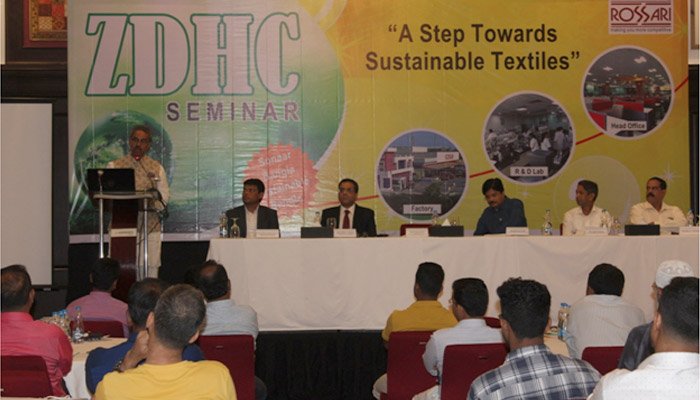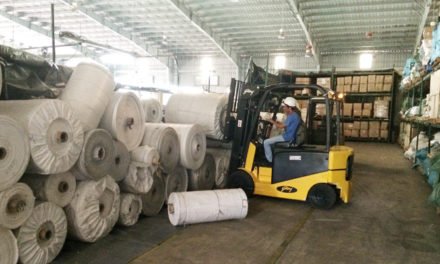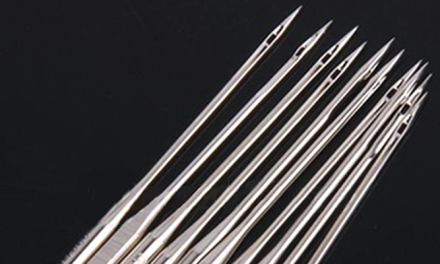Rossari Biotech is one of India’s leading manufacturers and exporters of textile chemical auxiliaries, enzymes, polymers and animal health care products. Founded in 1997, Rossari Biotech Ltd. was the brainchild of the two founding partners, Edward Menezes and Sunil Chari. The company organised a seminar titled ‘A Step Towards Sustainable Textiles’ on 3 August 2018 to promote sustainability in the textile industry of Bangladesh. The theme of the seminar was ‘Shonar Bangla Sustainable Bangla’.
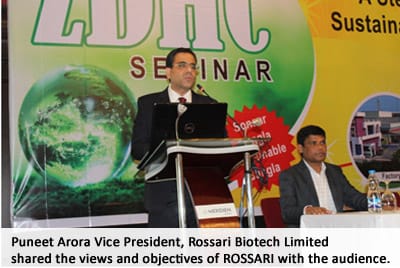 Puneet Arora, Vice President, Rossari Biotech Limited, shared the views and objectives of Rossari with the audience. He stated, “Rossari is recognised as a pioneering force in the Indian textile industry to provide end to end solutions in textile processing and tailor-made solutions to their customers. Rossari has set-up ‘State of the Art’ facilities for the manufacturing process and has dedicated research and development (R&D) labs at their HO and Factory.”
Puneet Arora, Vice President, Rossari Biotech Limited, shared the views and objectives of Rossari with the audience. He stated, “Rossari is recognised as a pioneering force in the Indian textile industry to provide end to end solutions in textile processing and tailor-made solutions to their customers. Rossari has set-up ‘State of the Art’ facilities for the manufacturing process and has dedicated research and development (R&D) labs at their HO and Factory.”
“With an unbeatable combination of R&D and best technical support, Rossari is constantly striving for and coming out with newer products and molecules. Rossari has products for textiles, spatiality chemicals for coatings, paints, and inks. Rossari also has animal health & nutrition, silicone oil, laundry & industrial cleaning chemicals and polymers for paints, ceramics, water treatment, paper & textiles products,” Puneet Arora said.
Rossari started its business in 1996, which was accorded as a one star Export House in 2016 and in 2008 the company received an SE-1A rating for highest performance capability and high financial strength from Crisil. Its products are regularly exporting to 17 different countries all over the world. The products are successfully tested by the R&D team and approved by the marketing team before being forwarded for the pilot scale production, which is a mini replica of the full-fledged production plant. The developed product is then tested for its commercial viability and is scaled up to a commercial level of production. Rossari has joint venture business with Buzil, Unilever, Hydra Italia & Cyra Chem.
Puneet Arora mentioned in his speech that Rossari was recognized as the ‘Star Performer 2018 for Innovation’ by Arvind Industries for consistency in delivering quality products, in-depth and Key performance in Continuous Bleaching Range (CBR) system.
Rossari has a sustainable approach which minimises use of resources (Water and Energy), chemical consumption, pollution load, elimination of toxic chemicals from the supply chain and eliminates harmful chemical residues from the final textile product. Rossari believes in ‘Live in the present, but don’t ignore the future.’
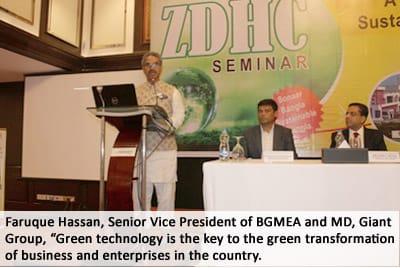 Faruque Hassan, Senior Vice President of BGMEA said, “Green technology is the key to the green transformation of business and enterprises in the country. Sustainability is the major initiative of most of the brands and suppliers. Now, Bangladesh has the highest number of green factories in the world. The policy is must for green revelation as it shows the path.”
Faruque Hassan, Senior Vice President of BGMEA said, “Green technology is the key to the green transformation of business and enterprises in the country. Sustainability is the major initiative of most of the brands and suppliers. Now, Bangladesh has the highest number of green factories in the world. The policy is must for green revelation as it shows the path.”
“Most of the chemical suppliers are taking ZDHC initiative to protect our environment. I think for sustainable business we need more sustainable product,” he added. Prashad Pant, South Asia Director (ZDHC Program) congratulated Rossari for joining ZDHC and then proceeded to share the views and objectives of ZDHC. He said, “Do not confuse ZDHC with only zero discharge of chemicals in wastewater. It is one of the aims of ZDHC and it is more of a holistic programme towards chemical management. ZDHC is an initiative for widespread implementation of sustainable chemistry and environment friendly practices in the textile, apparel, leather and footwear supply chain through collaborative engagement, standard setting, implementation and innovation of projects. First of all, we should know what we are going to eliminate.”
According to the UN, a child dies from water-related disease every 15 seconds in the world. Textile industry is known as one of the most polluting industries. There are lots of factories in the world where the wastewater discharged from a textile manufacturing plant is not treated enough to remove all these hazardous substances from going into the river.
There are chemicals present which can cause certain death, chemicals which can damage skin or cause irritation and there are chemicals which are now known as cancer-causing chemicals. The chemicals which are produced are not limited to the production area but it is transported either through water or through air to various parts of the world even to the North Pole, explained Prasad.
Focusing the working procedures and different tools of ZDHC he said, “ZDHC is a holistic approach to Sustainable Chemical Management which includes ‘Input’, ‘Process’ and ‘Output’. In each Focus Area, we establish industry standards and tools for implementation.”
The ZDHC MRSL is a list of chemical substances that should be banned from usage by the industry in the production of textile, apparel, leather, and footwear. The ZDHC MRSL applies to chemicals used in facilities that process materials and trim parts for use in the industry, he said.
Chemicals in the ZDHC MRSL include solvents, cleaners, adhesives, paints, inks, detergents, dyes, colorants, auxiliaries, coatings and finishing agents used during raw material production, wet-processing, maintenance, wastewater treatment, sanitation and pest control. The RSL governs the outputs (finished product) to protect consumers.
Prashad said, “Greenpeace challenged the Brands to commit their entire supply chain to shift to discharge of Zero-Toxic chemicals across all pathways. Our mission is to enable brands, retailers and their supply chain partners in the textile, apparel, leather and footwear industries to implement sustainable chemical management best practice across the value chain.”


